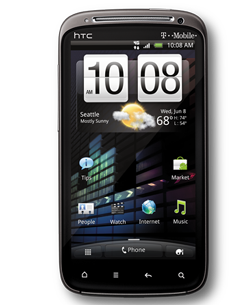Trade Commission Preliminary Ruling: HTC Infringes Two Apple Patents
The International Trade Commission (ITC) of the United States issued a ruling today that HTC's Android devices infringe of two of ten Apple patents. The ruling could cause major problems for HTC, given that Apple has asked the court for an injunction prohibiting the phone manufacturer from shipping any Android devices to US shores. HTC's counsel, Grace Lei, sought to downplay the decision in a recent statement. "Apple filed suit on 10 of its patents against HTC, but based on the judge's initial decision today only prevailed on 2 of those patents. HTC will vigorously fight these two remaining patents through an appeal before the ITC Commissioners who make the final decision," Lei said.
The patents in question are 5,946,647 and 6,343,263. The former (the '647 patent) describes "A system and method causes a computer to detect and perform actions on structures identified in computer data." The latter (the '263 patent) refers to "A data transmission system having a real-time data engine for processing isochronous streams of data includes an interface device that provides a physical and logical connection of a computer to any one or more of a variety of different types of data networks."

Florian Mueller, a patent expert, has written an extensive post at FOSS Patents where he details how HTC's Android devices have infringed on the two patents. His analysis is here, but the long and short is this: There's no simple way for HTC to bring its devices into patent compliance. Indeed, if Apple's patents stand, a number of manufacturers are going to be in serious trouble. Apple has sued Motorola for infringement of '647 and '263 as well—the HTC decision could lead to declatory judgment in Motorola's case.
As we noted last week, HTC's surprise purchase of S3 Graphics is intended to give the company additional leverage to combat this sort of manuever. Apple has been found to be in violation of S3 Graphics' patents--you can bet HTC will attempt to use this to negotiate a patent license.
The ITC declaration isn't absolute and fortunes have been known to change on appeal. This decision, however, is part of a wider assault on Android by multiple companies, each of whom want a piece of the action or, in Apple's case, to cripple its competitors. Mueller writes: Android is also under fire in dozens of federal lawsuits. By my count, there are 49 Android-related infringement suits (federal and ITC). A very prominent one is Oracle's lawsuit against Google, and the judge presiding over that case has raised very serious questions about the possibility of Google's intentional infringement of Java-related intellectual property."
The judge likely won't award an immediate injunction--the damage from doing so is such that injunctions are typically postponed until appeals have been exhausted and the process is concluded. Even so, this could be the year that lawsuits cripple Android--manufacturers will almost certainly slow their product introductions as they search for ways to license the appropriate patents, engineer their way around them, or turn to other options with less of a risk.
The patents in question are 5,946,647 and 6,343,263. The former (the '647 patent) describes "A system and method causes a computer to detect and perform actions on structures identified in computer data." The latter (the '263 patent) refers to "A data transmission system having a real-time data engine for processing isochronous streams of data includes an interface device that provides a physical and logical connection of a computer to any one or more of a variety of different types of data networks."

Florian Mueller, a patent expert, has written an extensive post at FOSS Patents where he details how HTC's Android devices have infringed on the two patents. His analysis is here, but the long and short is this: There's no simple way for HTC to bring its devices into patent compliance. Indeed, if Apple's patents stand, a number of manufacturers are going to be in serious trouble. Apple has sued Motorola for infringement of '647 and '263 as well—the HTC decision could lead to declatory judgment in Motorola's case.
As we noted last week, HTC's surprise purchase of S3 Graphics is intended to give the company additional leverage to combat this sort of manuever. Apple has been found to be in violation of S3 Graphics' patents--you can bet HTC will attempt to use this to negotiate a patent license.
The ITC declaration isn't absolute and fortunes have been known to change on appeal. This decision, however, is part of a wider assault on Android by multiple companies, each of whom want a piece of the action or, in Apple's case, to cripple its competitors. Mueller writes: Android is also under fire in dozens of federal lawsuits. By my count, there are 49 Android-related infringement suits (federal and ITC). A very prominent one is Oracle's lawsuit against Google, and the judge presiding over that case has raised very serious questions about the possibility of Google's intentional infringement of Java-related intellectual property."
The judge likely won't award an immediate injunction--the damage from doing so is such that injunctions are typically postponed until appeals have been exhausted and the process is concluded. Even so, this could be the year that lawsuits cripple Android--manufacturers will almost certainly slow their product introductions as they search for ways to license the appropriate patents, engineer their way around them, or turn to other options with less of a risk.

